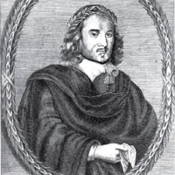
This work is in the public domain in its country of origin and other countries and areas where the copyright term is the author's life plus 100 years or fewer.
Thomas Middleton
Playwright
Biography
Thomas Middleton
Baptized on April 18, 1580, much of Thomas Middleton's early life is a mystery. He was born and raised in London, and attended Oxford (although he never graduated). He began by writing pamphlets, and by the early 1600s--according to Philip Henslowe's diary--he was writing for the Admiral's Men, Henslowe's theatrical company.
After King James I came to the English throne, Middleton truly began his career. He worked within the popular genres of the time: revenge tragedy and city comedy. With Thomas Dekker, he wrote The Roaring Girl(1611), a biography of Mary Frith, a contemporary cutpurse. Working alone, he composed his masterpiece A Chaste Maid in Cheapside (1613), now considered one of the best examples of Jacobean comedy.
One of Middleton's most important and profound plays was The Changeling (1622), a collaboration with William Rowley and today regarded as the most significant tragedy of the Jacobean period. Prior to this play, he had earned a tragedian's reputation with The Revenger's Tragedy (1606) and Women Beware Women (1621).
Beyond the theatre, Thomas Middleton was involved in the civic affairs of London. In 1620, he was appointed chronologist of the City of London, a post of some esteem, tasked with keeping the dates and calendar of the city. His final play, the political satire A Game of Chess (1624) potentially upset the Privy Council of England, and it seems he was banned from writing for the stage ever again.
In 1627, Thomas Middleton died in London, and was buried July 4 in St. Mary's Churchyard. His plays remained popular long after his death, and continue to be staged today.
Shows
Shows associated with Thomas Middleton
Monologues
Monologues from shows associated with Thomas Middleton
Scenes
Scenes from shows associated with Thomas Middleton
Quizzes
Quizzes associated with Thomas Middleton
Learning Modules
Learning modules associated with Thomas Middleton
Additional Information
N/A